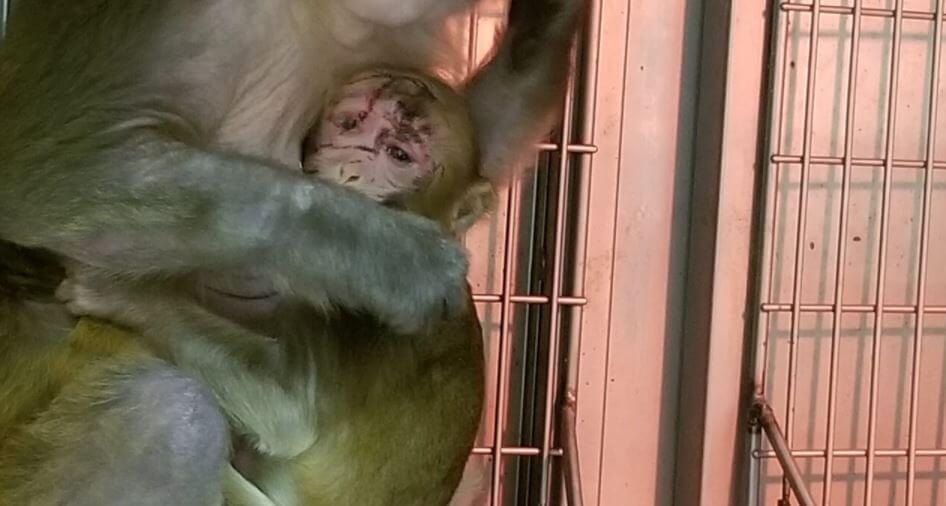Animals Scalded to Death, Starved as These 5 Universities Rake In Taxpayer Cash
Let’s be clear: All animal experimentation laboratories are nightmares, and none should exist. But in descending order of terribleness, there are the worst laboratories, the worst of the worst, and those at the bottom of the barrel.
And then there’s a trapdoor into these hellholes.
PETA scientists have identified five academic institutions as the most frequent violators of federal animal welfare guidelines among schools with taxpayer-funded laboratories. They presented those findings at the 12th World Congress on Alternatives and Animal Use in the Life Sciences, held recently in Niagara Falls, Canada.
The Flagrant Five are the University of Wisconsin–Madison, Baylor College of Medicine, and the universities of Pittsburgh, Washington, and Minnesota.
PETA scientists examined federal reports and identified the 25 schools receiving the most money from the National Institutes of Health (NIH), totaling $9.5 billion. They found a jaw-dropping 632 animal welfare violations among those schools in just a 41-month period.
Of that total, the Flagrant Five are responsible for 295 violations. That’s just a sliver shy of 47% of all the violations in the study.
Behind the Statistics
The number of violations at these schools is, without a doubt, staggering, but that’s only part of the story. Each violation represents unmitigated suffering inflicted on a sentient being unable to defend themselves against it—and each one is a separate act of violence.
- At the University of Wisconsin–Madison—the “Offender-in-Chief” of the Flagrant Five, with 72 violations—an infant monkey died after being left without water overnight. And in four separate incidents, mice endured agonizing deaths because staff left them without food or water. The school received $365 million from NIH in 2022.
- At Baylor College of Medicine, which is responsible for 63 violations, two mice were trapped in a cage that was sent through a high-temperature cage washer, scalding them to death. Another mouse was euthanized after being burned during surgery when a tool burst into flames. Baylor received $365 million from NIH in 2022.
- The University of Pittsburgh is responsible for 59 violations, including an incident in which a monkey required the partial amputation of four toes after an escape. And in more than 30 separate incidents, mice endured agonizing and painful deaths after staff left them without food or water. The school received $675 million from NIH in 2022.
- There were 53 separate violations at the University of Washington, home to the notorious Washington National Primate Research Center. At the school’s Arizona facility, after staff left a cage unlocked, a juvenile monkey escaped and was severely injured by another monkey, requiring the amputation of their left arm. In another incident, 19 mice died of starvation after staff left them without food for 12 days. The school received $592 million from NIH in 2022.
- In one of the University of Minnesota’s 48 violations, a monkey was burned on the lower abdomen and back after staff failed to monitor a heating device during surgery. A dozen mice confined to three cages were found without food. One was dead, and three others required medical attention. The school received $433 million from NIH in 2022.
What Does It All Mean?
The federal government has set the bare minimum of standards for the care of animals in laboratories: Provide them with food and water. Don’t scald them to death. Things like that.

But despite gobbling up roughly $2.4 billion in taxpayer funding in 2022 alone, none of these five schools can manage even that much. Their utter and complete failure at even the most rudimentary of animal care functions betrays either contempt for animal lives or an embrace of incompetence. Or both. Either way, the same government that set those standards should stem the flow of money when they’re not met, or there’s no point in having them at all.
Since the Flagrant Five show no symptoms of “sudden-onset competence syndrome,” the billions they receive each year would be better spent on non-animal research methods, such as those outlined by PETA scientists’ Research Modernization Deal.
What You Can Do
Please TAKE ACTION: Let these institutions know that what happens to animals in their labs is unacceptable:

